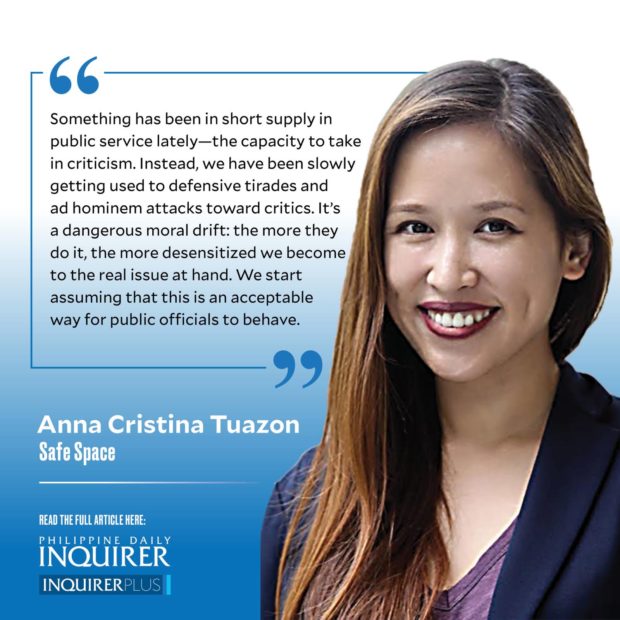‘Winarak’ and the misuse of emotions
Something has been in short supply in public service lately — the capacity to take in criticism. Instead, we have been slowly getting used to defensive tirades and ad hominem attacks toward critics. It’s a dangerous moral drift: the more they do it, the more desensitized we become to the real issue at hand. We start assuming that this is an acceptable way for public officials to behave. The more we accept, the less we insist on true accountability. Their outrage turns into memes until eventually people move on to the next hot topic.
The past week’s spotlight was on Department of Health Secretary Francisco Duque III who accused the Commission on Audit (COA) of destroying DOH’s honor in a now infamous quote “Winarak niyo kami.” This was in response to COA’s report over deficiencies amounting to more than P67 billion in DOH’s COVID-19 response fund last year. This gave me a sense of déjà vu—only last month, Education Secretary Leonor Briones accused the World Bank of shaming the country when it released a report showing poor learning performance of Filipino students.
It’s only natural to get hurt and upset when you face criticism, especially on the national or international scale. It doesn’t automatically make criticism wrong or unfair. As a public servant, you have the responsibility to address the content of the criticism — and not on how much it hurt you. If the criticism is indeed unfair, then counter it with facts and context. The best way to preserve your honor is to act honorably.
It is important to make space for emotions to provide context to a situation. Decision-making completely devoid of emotions will lack empathy and compassion. However, emotions can also be misused to obscure the facts. When the criticism is based on budget deficiencies, why counter with emotions when you can simply explain the circumstances in which funds weren’t released? When people use emotional appeals, it makes us wonder if it’s because they know they do not have the facts to support their case.
Playing on people’s emotions or sympathies can be a very effective form of persuasion. There are two general ways to persuade: by using information or by using general impressions. The latter, called the peripheral route to persuasion, includes the use of emotions to sell a product or an idea. In advertising, they use the peripheral route when they know that either the facts are not on their side or that people are not interested in what they have to sell. In politics, they use the peripheral route when convincing us of rules and decisions that do not have a strong rational basis.
Appealing to emotions also helps control the public narrative. By using the word “winarak,” it distorted the intent of COA, which is to provide check and balance, into something malicious. A healthy use of emotion in public discourse is when it enriches the narrative and provides layers of context to capture the full truth. One of the gravest misuses of emotions is when it turns reality into a two-dimensional telenovela: good vs. bad, hero vs. villain. A flat narrative forces us to focus on only one character’s perspective—rendering others invisible. Whose perspective goes missing when public officials focus on how insulted they were? Whose story remains invisible as we focus on sound bites and memes?
When being called out for a misdeed or lack of competence, the focus shouldn’t be on its impact on you but on your impact on others. This is called public service. People who only focus on how they look in a situation without taking the time to reflect if they really did a disservice to others will ultimately only make decisions that benefit themselves.
The ability to take in criticism—and more importantly, to learn from it—allows us to adjust our behaviors and plans to make them more effective and, in turn, better the lives of others. Attacking the critic, for a public servant, is simply a diversion of energy that is better spent toward fixing our nation’s problems.
Don’t just focus on looking good but actually do good. Do good long enough and the work will speak for itself.
This is a good reminder for citizens: choose leaders who can handle criticism well. Choose leaders who are humble enough to acknowledge their mistakes and takes steps to correct them. Choose leaders who can respect differing opinions enough to come up with effective solutions for our country.

















